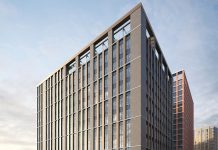The proportion of visitors to Manchester using Airbnb in 2017 jumped to 5.6% as the online platform accounted for more than 304,700 overnight stays, according to the latest data from Colliers International.
The commercial property firm found that bookings on Airbnb for properties in Manchester were up 57% compared to 2016, while the website’s market share of this huge visitor accommodation market grew from 3.6% to 5.6%.
2017 also saw a significant 46% increase in the supply of Airbnb accommodation units, now totalling 4,321 across the wider Manchester market, with the single largest proportion originating from single property listers. That said, over 39% of units are provided by multi-listers with three or more properties, further suggesting that the local Airbnb market is beginning to evolve as a commercial sector in its own right.
Private rooms remain the most popular type of accommodation amongst Airbnb users in Manchester, representing over 51% of all bookings at an average of €44 per night. This is followed by two-bedroom properties (22%), which have seen a slight rise in popularity since 2016. The most notable shifts, however, have been at the two opposite ends of the sharing accommodation spectrum. 2017 saw a 33% year-on-year rise in shared room bookings, with an ADR of €31, highlighting the relative affordability of the Airbnb market compared to lower grade hotel sectors across the city. Similarly, there was an almost 39% increase in bookings of four-bedroom properties, where the ADR was substantially higher than the Manchester average, recorded at €261.
Marc Finney, Head of Hotels & Resorts Consulting at Colliers International, explains: “The figures for Manchester are interesting in that the take-up of Airbnb is considerably lower than other comparable cities, such as Edinburgh where the Airbnb share of the market is closer to 20%. This reflects a number of factors, chief of which is the more business and commercial nature of the accommodation market in Manchester and this is a sector that Airbnb has been less well able to penetrate than the leisure market. It also reflects the relative supply positions of the markets. Manchester has a wide and broad range of accommodation and has several thousand more rooms than Edinburgh.”
The study, carried out in partnership with Hotelschool The Hague, comes at a time when tourist destinations around the world have been calling for Airbnb to be regulated, capped or even banned.
Julian Troup, Head of UK Hotels Agency for Colliers International, said the hospitality industry is concerned that the Airbnb success story is partly due to an “unlevel playing field,” as the accommodation platform is currently not burdened by the regulatory regime for hotels and guest houses. Local authorities and regulators will need to wrestle with what the scope of a future regulatory framework would look like, without driving private property owners away from the platform and stifling an emerging market.
He said: “Given how scarce affordable accommodation is in Manchester during the summer, you can understand why some property owners are taking the opportunity to rent out their apartments. These statistics show that there is also a huge and growing demand for more cheaply-priced visitor accommodation in the city. Airbnb is clearly attempting to fill a gap in the supply of peak season affordable accommodation in Manchester.”





















